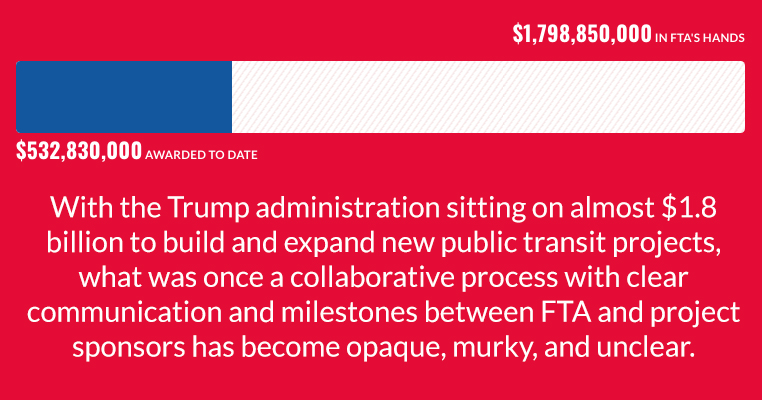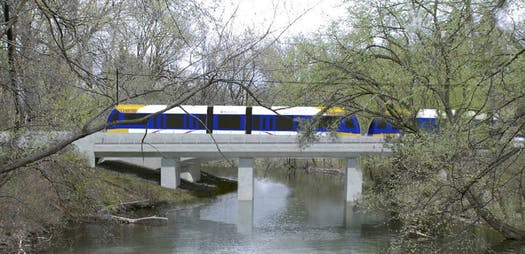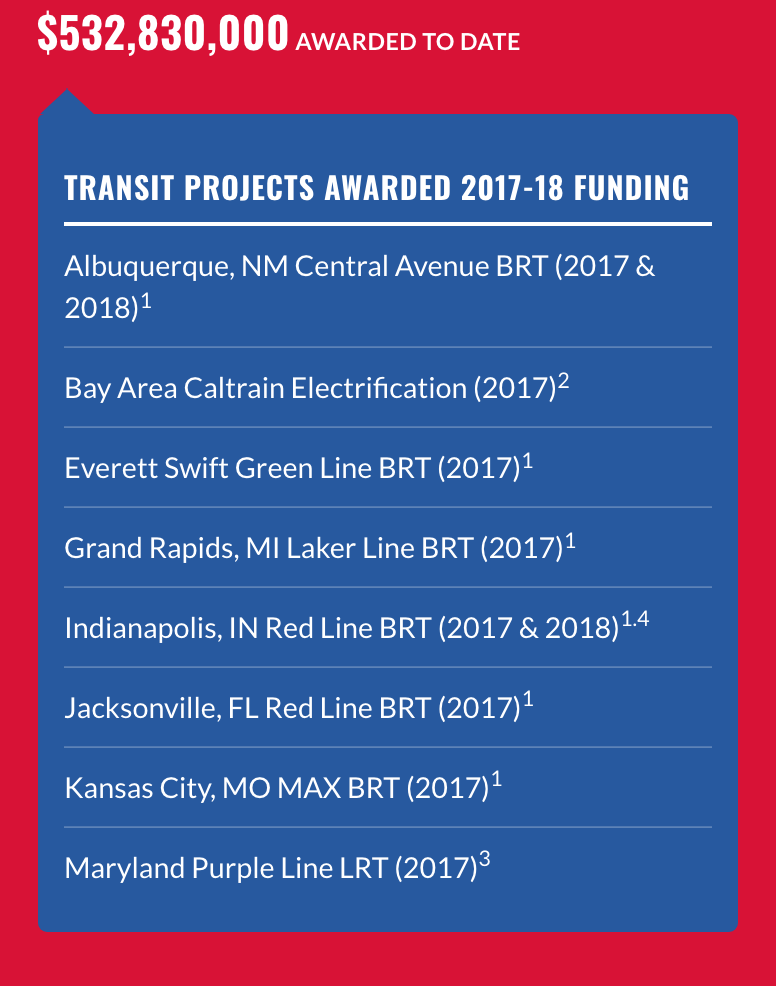Cities left in the dark by an agency that once partnered with them to build new transit
Many local transit project sponsors are in the dark about the status of their applications for federal transit funds, left to wonder why the Federal Transit Administration (FTA) has not granted funding to their projects. But these cities have remained publicly quiet about it for fear of harming their chances of eventually receiving funding, taking the pressure off the administration to fund and support transit projects.

As we have previously identified, the Trump administration is sitting on almost $1.8 billion to build and expand new public transit projects. What was once a collaborative process with clear communication and milestones between FTA and project sponsors has become opaque, murky, and unclear.
For this reason, over the last few months, we at T4America have spent some time interviewing the majority of these communities. While each community’s story is unique and none wanted to go on the record, several common themes emerged:
- A lack of transparency
- Unexplained delays from FTA over processing final paperwork, most often connected to political offices within USDOT
- FTA’s poor communication and slowed-down process is leading to potential delays and cost increases for local taxpayers
- Not all projects have faced delays
1) A lack of transparency
Both of President Trump’s budget proposals so far have asked Congress to provide zero dollars for new transit projects. FTA has cited these budget requests (twice rejected by Congress) as a rationale for breaking with precedent and no longer providing Congress (and the public) with annual reports clearly detailing which new projects would receive funding that year, if Congress appropriates the dollars (which Congress has done.) This lack of transparency has eliminated local project sponsors’ ability to point to their project in these annual reports and, therefore, hold FTA accountable for keeping to their timeline.
In addition, FTA has privately told some project sponsors that the failure of the Wave Streetcar project in Ft. Lauderdale, FL, required them to delay other projects, ostensibly to evaluate the risk of cost increases. According to a number of communities, FTA staff communicated that they would not sign new grant agreements for a period of months after the Wave Streetcar failure. But FTA has done nothing to explain (to the public or sponsors) precisely how the failure of a single project in Florida has any bearing on other projects in other states that have been advancing through the pipeline. Further, while the Wave Streetcar is certainly a failure in that it is not being built, the federal government never lost a dime on the project—a win for the process from their standpoint.
2) Unexplained delays from FTA over processing final paperwork, most often connected to political offices within USDOT
Several local project sponsors we spoke to described many months of bizarre hurdles and unexplained delays. In virtually all instances, project sponsors described helpful and productive conversations with the career FTA staff, which were subsequently undermined by kafkaesque levels of bureaucracy within the offices of the Secretary and Deputy Secretary at USDOT. One community described regional FTA career staff informing them that they just didn’t know why their project was delayed. Ultimately, it took personal inquiries from their House and Senate delegations before FTA provided information and ultimately advanced the project.
Another community described productive conversations with regional career staff until the project was elevated to the USDOT Secretary’s office, at which point communication stalled, and the project was inexplicably delayed for months. Again, personal involvement by their House and Senate delegation was required to get the project moving again.
Ultimately, it appears that high-level political influence is the only surefire method for finally advancing a project, as happened with the Caltrain electrification project approved early last year, where members of the California congressional delegation wrote to Sec. Elaine Chao, and/or set up meetings with her or her staff.
Still other sponsors described situations where FTA staff who would highlight flaws in an application without providing instructions or a timeline for addressing them. Imagine taking your car to the mechanic and being told only that the car is broken, leaving you on your own to guess what’s wrong with it. This has resulted in countless wasted hours attempting to understand the flaw, guessing at what FTA would consider an acceptable solution, and having multiple conversations with FTA staff to present updated applications. Under previous administrations, the FTA was a partner, cooperating with cities to both put together the best possible projects and help actively shepherd them through the process toward receiving funding and getting built.
That is clearly no longer the case.
3) FTA’s poor communication and slowed-down process is leading to potential delays and cost increases for local taxpayers

The two major construction bids for the SW light rail project in Minneapolis expired at the end of September while the agency waited for word from USDOT & FTA.
For many localities, the delays described above have affected project sponsors’ contracting schedule, either jeopardizing their ability to pay contractors or delaying their ability to award contracts (leading to cost increases). In Los Angeles, some construction bids were set to expire in early October. In Minneapolis, where they were hoping to begin construction this fall on the SW light rail extension before the weather gets harsh, their biggest construction bids expired at the end of September as they awaited word from FTA. (One bidder has given an extension, the other has not.) Both cities are still waiting for approval from FTA to fund their projects.
Several localities described cost increases associated with these delays. And one community described a prime contractor that was turning away work because it was committed to working on their project, yet the locality was unable to pay the contractor because its grant was delayed.
To address this issue, some localities have requested something called letters of no prejudice which allows them to begin spending their own money on a project and later receive reimbursement from FTA (if they are awarded a grant). But these letters are really a formality, providing zero guarantees from FTA that their projects will ever be approved. In this scenario, these communities are spending more local money up front for aspects of a project that should have been funded by a federal grant. By delaying and refusing to sign grant agreements, FTA is putting the onus on locals to spend more money to keep these projects alive while waiting for FTA. This is occuring all while FTA is often unable to articulate what is standing in the way of their approval.
 4) Not all projects have faced delays
4) Not all projects have faced delays
Finally, in the interest of fairness, we note that not all projects have been delayed. A small number of localities we spoke to have described a consistently productive relationship with FTA, and this is indeed good news. Unfortunately, the overwhelming majority of communities are either waiting or are unclear about the status of their projects.
And this is also true: USDOT has yet to approve a major multi-year full-funding grant agreement for a larger rail transit project, after signing two early in 2017 that were largely processed by the previous administration. All of the other approvals thus far have been small or single-year projects that don’t come with future fiscal obligations for FTA — an important distinction considering the fact that they’re likely to (once again) only ask Congress for enough money to fund the in-progress projects for which FTA is legally required to continue funding.
And the numbers do not lie. FTA is sitting on almost $1.8 billion dollars. How much longer must communities wait?
Alex Beckmann and Stephen Lee Davis contributed to this post.




















Pingback: Transportation For America – Cities eager to receive transit dollars from USDOT are receiving letters instead